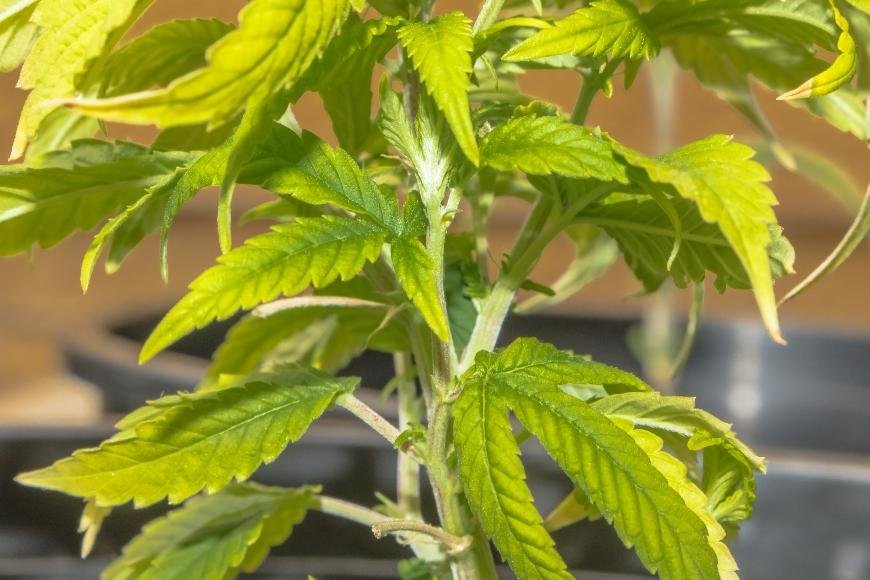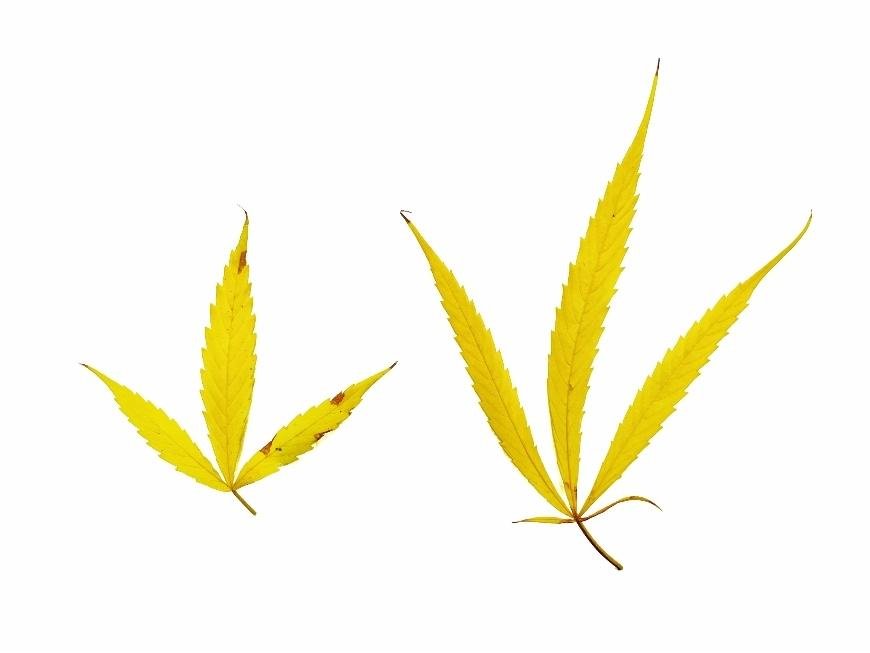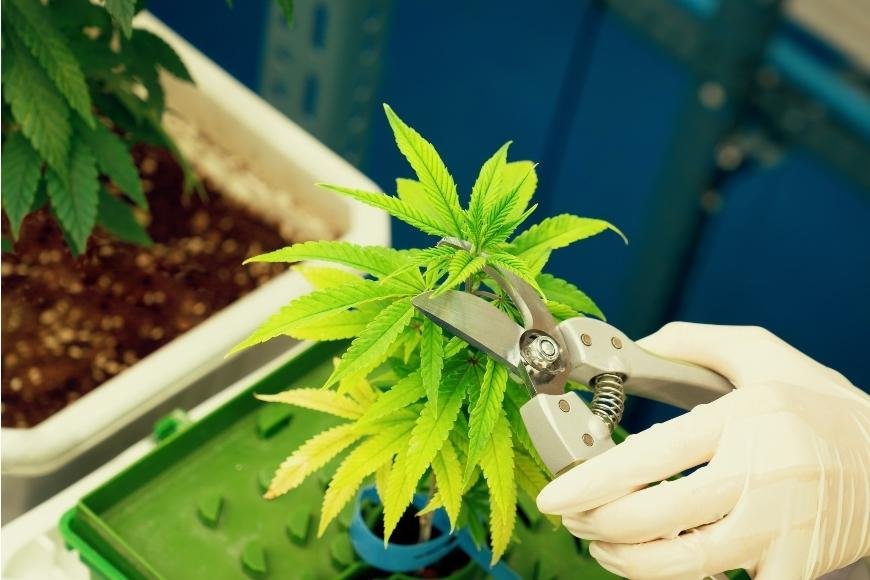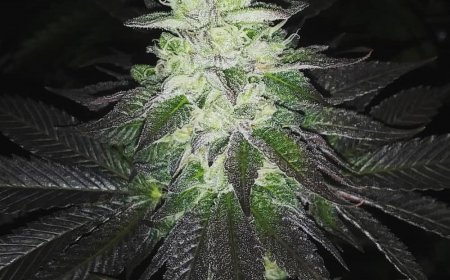How to Fix Zinc Deficiency in Cannabis Plants
Learn how to fix zinc deficiency in cannabis plants with our quick guide, covering identification, organic and chemical solutions, prevention, and benefits.

Addressing zinc deficiency in cannabis plants is an important concern for both beginning and experienced growers, as it can greatly influence the health and yield of their marijuana crop. In this comprehensive guide, we will delve into the intricacies of identifying and addressing zinc deficiencies in cannabis plants.
Zinc plays a vital role in various plant processes such as enzyme production, protein synthesis, and overall growth regulation. By understanding the causes behind zinc deficiency due to factors like pH levels or nutrient lockout, you'll be better equipped to address these issues promptly.
From organic solutions like adjusting soil composition to chemical interventions using high-quality fertilizers or nitric acid, we will explore different methods on how to fix zinc deficiency in cannabis plants effectively. Additionally, preventative measures that ensure optimal nutrient uptake will also be discussed so that you can cultivate thriving weed plants with minimal complications.
Table of Contents:
- Identifying Zinc Deficiency in Cannabis Plants
- Symptoms of Zinc Deficiency
- Detecting Zinc Deficiency Early On
- Causes of Zinc Deficiency in Cannabis Plants
- Organic Solutions for Zinc Deficiency in Cannabis Plants
- Chemical Solutions for Zinc Deficiency in Cannabis Plants
- Preventing Zinc Deficiency in Cannabis Plants
- Benefits of Treating Zinc Deficiency in Cannabis Plants
- Benefits of Treating Zinc Deficiency in Cannabis Plants
- Frequently Asked Questions How to Fix Zinc Deficiency in Cannabis Plants
- Conclusion
Identifying Zinc Deficiency in Cannabis Plants
Zinc inadequacy in cannabis plants can be the source of many problems that could damage your harvest's health and productivity. Early detection of zinc deficiency is essential to take corrective measures before the damage becomes irreversible. In this part, we'll explore some of the typical signs connected to zinc deficiency and how you can identify them.
Symptoms of Zinc Deficiency
- Stunted Growth: One of the first indicators of zinc deficiency is slowed or stunted growth. The plant may appear smaller than usual, with shorter internodes (the space between nodes) and reduced branching.
- Yellowing Leaves: A telltale sign of zinc deficiency is yellowing leaves, particularly around the edges. This condition, known as chlorosis, occurs because zinc plays a vital role in chlorophyll production - an essential component for photosynthesis.
- Brown Spots & Leaf Curling: As the deficiency progresses, brown spots may begin to appear on older leaves along with leaf curling or twisting.
- Poor Bud Development: Ultimately, if left untreated, zinc deficiency will impact bud development leading to reduced yields and lower potency levels.
Detecting Zinc Deficiency Early On
To catch any potential deficiencies early on in your cannabis plants' life cycle pay close attention during their vegetative stage when they are most susceptible due to rapid growth rates. Regularly inspect your plants for any signs of the symptoms mentioned above and take note of any changes in their overall appearance.
It's important to remember that zinc deficiency can sometimes be mistaken for other nutrient deficiencies, such as iron or manganese. Therefore, it's crucial to consider all factors before diagnosing and treating your cannabis plants. Moving forward, we'll explore the potential sources of zinc deficiency and how to remedy them.

Causes of Zinc Deficiency in Cannabis Plants
Zinc deficiency in cannabis plants can be caused by various factors, which may negatively impact their growth and development. Understanding these causes is essential for effectively addressing the issue and ensuring your plants receive adequate nutrients to thrive.
Poor Soil Quality
One common cause of zinc deficiency is poor soil quality. Soils that are low in organic matter or have been overworked through excessive cultivation often lack sufficient levels of zinc. To improve soil quality, consider incorporating compost or other organic materials into your growing medium.
Over-Fertilization with Phosphorus
Excessive phosphorus can lead to a zinc deficiency by creating an imbalance between these two nutrients, as it competes with the latter for uptake by plant roots. When there's too much phosphorus present, it competes with zinc for uptake by plant roots, resulting in reduced availability of this essential micronutrient. Be cautious when applying phosphorus-based fertilizers, and always follow recommended application rates.
- TIP: Use a balanced fertilizer specifically designed for cannabis plants to ensure proper nutrient ratios.
pH Imbalances
The pH level of your growing medium plays a crucial role in nutrient availability for cannabis plants. Zinc becomes less available at higher pH levels (alkaline conditions), leading to potential deficiencies if not addressed promptly. It's important to regularly test the pH level around your plant roots and make necessary adjustments using appropriate products like pH up/down solutions or lime/dolomite. The optimal pH range for cannabis is between 6.0 and 7.0 - an area where zinc can be accessed most effectively by the roots of the plant.
Root Damage or Disease
Damage to plant roots caused by pests, diseases, or physical injury can hinder their ability to take up nutrients like zinc from the soil effectively. Be on the lookout for indications of root harm or infection in your cannabis plants and quickly address any issues with suitable treatments such as beneficial microorganisms, fungicides, or pesticides.
Inadequate watering practices may also contribute to zinc deficiency by limiting nutrient uptake through the roots. Ensure that you're providing consistent moisture levels without overwatering your cannabis plants.
Organic Solutions for Zinc Deficiency in Cannabis Plants
Zinc deficiency can be a major issue for cannabis plants, but there are several organic solutions that you can use to provide the necessary nutrients. These methods not only help address zinc deficiency, but also contribute to overall plant health and sustainability.
Compost and Manure
Compost is an excellent source of essential nutrients, including zinc. Adding compost made from various organic materials such as kitchen scraps, leaves, or grass clippings will slowly release zinc into the soil over time. Similarly, manure, especially from poultry or cows, contains significant amounts of zinc that can benefit your cannabis plants.
Epsom Salt Solution
An Epsom salt solution provides magnesium and sulfur to your cannabis plants while indirectly helping with their uptake of other micronutrients like zinc. To create this solution, dissolve one tablespoon of Epsom salt per gallon of water and apply it directly to the soil around your plants every two weeks during their vegetative growth stage.
Kelp Meal Fertilizer
Kelp meal fertilizer is another great option for providing trace minerals such as zinc along with many other beneficial nutrients like potassium and nitrogen. Sprinkle kelp meal on top of the soil before watering or mix it into the soil when transplanting your cannabis plants.
Alfalfa Meal
Alfalfa meal is a nutrient-rich organic fertilizer that contains small amounts of zinc. Incorporate it into the soil around your cannabis plants to improve overall plant health and boost their ability to absorb micronutrients like zinc more efficiently.
Zinc Chelates
If you're looking for a more direct approach, consider using zinc chelates. These are organic compounds that bind with zinc ions, making them more readily available for absorption by your cannabis plants. Apply according to the manufacturer's instructions and monitor closely to avoid over-application.
Incorporating these organic solutions into your cannabis growing routine will not only help address any existing zinc deficiencies but also contribute towards creating a healthy environment for optimal growth and yields. Remember, prevention is always better than cure; therefore, maintaining proper nutrient levels in the soil should be an ongoing priority for every grower.
Organic solutions for zinc deficiency in cannabis plants provide a natural, sustainable approach to maintaining the health of your crop. However, chemical solutions may be necessary if organic methods are unsuccessful or impractical; let's explore these options next.
Chemical Solutions for Zinc Deficiency in Cannabis Plants
Fortunately, there are several chemical solutions available that can help provide the necessary zinc to your plants. These options include using fertilizers specifically designed for cannabis plants or applying foliar sprays containing zinc.
Zinc-Containing Fertilizers
One effective way to address zinc deficiency is by using zinc-containing fertilizers. There are various types of fertilizers on the market that contain adequate amounts of zinc, such as:
- Chelated Zinc (Zn-EDTA)
- Zinc Sulfate (ZnSO4)
- Zinc Oxide (ZnO)
It's essential to follow the manufacturer's instructions when applying these products since over-application may lead to toxicity issues. Maintaining the ideal soil pH of 6.0-7.0 is key to ensure that the plant roots can absorb zinc and other essential nutrients from fertilizers effectively.
Foliar Sprays with Zinc Compounds
Foliar sprays, which involve directly spraying nutrient solutions onto plant leaves, offer another method of addressing zinc deficiencies in cannabis plants. This approach allows for faster absorption compared to soil-based applications since it bypasses root uptake mechanisms.
To create a foliar spray solution containing zinc compounds, you can use:
- Zinc Sulfate (ZnSO4)
- Chelated Zinc (Zn-EDTA)
Mix the chosen zinc compound with water according to the manufacturer's instructions and spray it onto your cannabis plants' leaves. It is best to apply foliar sprays during early morning or late afternoon when temperatures are cooler, as this reduces the risk of leaf burn.
Incorporating chemical solutions such as zinc-containing fertilizers and foliar sprays into your cannabis plant care routine can help address and prevent zinc deficiencies. Ensuring your plants get enough zinc will help ensure healthy, high-yielding crops.
Preventing Zinc Deficiency in Cannabis Plants
Zinc deficiency can have a significant impact on the health and productivity of your cannabis plants. To ensure optimal growth and yields, it's essential to take preventive measures that promote proper nutrient uptake and maintain healthy soil conditions. Here are some tips for preventing zinc deficiency in your cannabis plants:
Maintain Optimal Soil pH Levels
One of the primary factors affecting zinc availability is soil pH levels. Cannabis plants thrive in slightly acidic soils with a pH range between 6.0-7.0, which also facilitates adequate zinc absorption. Regularly testing your soil's pH level and making necessary adjustments using lime or sulfur will help prevent nutrient deficiencies, including zinc.
Improve Soil Quality
Poor soil quality can hinder the uptake of essential nutrients like zinc by cannabis plants. Incorporating organic matter such as compost, aged manure, or worm castings into your growing medium will not only improve its structure but also increase its capacity to hold nutrients effectively.
- Compost: Rich in various micronutrients like zinc, adding compost to your soil helps enhance overall fertility while improving drainage and water retention capabilities.
- Aged Manure: A natural source of both macro- and micronutrients; well-aged manure provides slow-release nutrition for sustained plant growth over time.
- Worm Castings: Known for their high concentration of beneficial microorganisms that boost nutrient cycling processes within the soil; worm castings provide an excellent source of bioavailable trace elements such as zinc.
Monitor Nutrient Levels and Avoid Over-Fertilization
Fertilizing excessively can cause nutrient discrepancies, hindering plants' capability to obtain vital minerals such as zinc. It's crucial to follow the recommended feeding schedule provided by your chosen nutrient solution manufacturer, as well as monitor plant growth and appearance closely for signs of deficiency or toxicity. Adjusting nutrient levels accordingly will help maintain a balanced soil environment that promotes optimal nutrient uptake.
Choose High-Quality Fertilizers with Adequate Zinc Content
Selecting high-quality fertilizers specifically formulated for cannabis cultivation is vital in preventing micronutrient deficiencies such as zinc. Look for products containing chelated forms of trace elements, which are more readily available for plant absorption. In addition, consider using foliar sprays containing zinc sulfate or other soluble sources of this essential micronutrient during periods of rapid vegetative growth when demand is highest.
Taking these preventive measures will help ensure your cannabis plants receive adequate amounts of zinc throughout their life cycle, resulting in healthier plants and higher yields.

Benefits of Treating Zinc Deficiency in Cannabis Plants
Treating zinc deficiency in your cannabis plants can bring about numerous benefits that ultimately lead to a healthier, more productive grow. In this section, we'll explore some of the key advantages you can expect when addressing and resolving zinc deficiency issues.
Improved Plant Health
Zinc plays a crucial role in various plant processes such as enzyme activation and protein synthesis. Providing an adequate supply of zinc to your cannabis plants ensures they are supplied with the essential nutrients for their growth and development, resulting in healthier vegetation. This results in stronger stems, vibrant foliage, and overall better plant health.
Increase Yields
A healthy cannabis plant with proper nutrient levels will naturally produce higher yields. When zinc deficiency is addressed promptly and effectively, it allows the plant to focus its energy on producing buds rather than struggling with stunted growth or leaf discoloration. As a result, growers can enjoy larger harvests from their well-nourished plants.
Better Resistance Against Pests And Diseases
- Pest resistance: A strong immune system helps keep pests at bay by making it harder for them to penetrate the plant's natural defenses. Zinc is essential for maintaining cell wall integrity; thus, ensuring sufficient zinc levels makes it more difficult for pests like spider mites or aphids to infest your crop.
- Disease resistance: Adequate amounts of zinc also contribute significantly towards disease prevention by supporting vital functions within the plant cells that help combat pathogens like fungi or bacteria before they become problematic.
Faster Recovery From Stressors
Plants that have sufficient zinc levels are better equipped to recover from various stressors, such as transplant shock or extreme temperatures. By addressing zinc deficiency in your cannabis plants, you can minimize the negative impact of these stress factors and help them bounce back more quickly.
Improved Nutrient Uptake
Zinc plays a vital role in nutrient uptake processes, particularly for phosphorus - an essential nutrient for healthy root development and flowering stages of cannabis growth. Ensuring proper zinc levels will enable your plants to efficiently absorb other necessary nutrients, further contributing to their overall health and productivity.
Treating zinc deficiency is crucial for any grower looking to optimize their cannabis plant's performance and yield potential. By taking the necessary steps towards providing adequate amounts of this essential micronutrient, you'll enjoy healthier plants with improved resistance against pests, diseases, and environmental stressors while reaping the rewards of higher yields come harvest time.
Benefits of Treating Zinc Deficiency in Cannabis Plants
Treating zinc deficiency in cannabis plants is essential for maintaining their overall health and ensuring a successful harvest. By addressing this issue, growers can experience several benefits:
- Improved Plant Health: Providing the necessary zinc levels helps to strengthen plant tissues, support proper growth and development, and enhance the immune system. This leads to healthier plants that are more resistant to diseases and pests.
- Increase Yields: Healthy cannabis plants with adequate zinc supply produce larger buds with higher potency. The yield of both the amount and quality of your harvest is improved by having adequate zinc levels.
- Better Nutrient Absorption: Zinc plays a crucial role in nutrient absorption by aiding enzyme production. When zinc levels are optimal, your cannabis plants will be able to absorb other nutrients more efficiently, further improving their overall health.
- Faster Recovery from Stressors: Addressing zinc deficiency allows your cannabis plants to recover faster from stress caused by environmental factors such as temperature fluctuations or transplant shock. A resilient plant is less likely to suffer long-term damage or stunted growth due to these stressors.
To ensure you're providing your cannabis plants with all the necessary nutrients they need for healthy growth, consider using high-quality soil amendments. Additionally, it's important not only focus on treating deficiencies but also preventing them through regular monitoring of pH levels and adjusting nutrient solutions as needed.
Remember, a healthy cannabis plant will reward you with an abundant and potent harvest. Don't let zinc deficiency stand in the way of your growing success.
Frequently Asked Questions How to Fix Zinc Deficiency in Cannabis Plants
What can I give my plant for zinc deficiency?
To treat zinc deficiency in cannabis plants, you can use organic solutions like adding compost or manure rich in micronutrients to the soil. Alternatively, chemical solutions such as chelated zinc fertilizers or foliar sprays containing zinc sulfate are also effective.
What causes zinc deficiency in cannabis plants?
Zinc deficiency in cannabis plants is often caused by factors such as low soil pH, high levels of phosphorus and calcium, poor drainage conditions, and overwatering. These factors inhibit the absorption of available zinc from the soil into the plant's roots.
How do I give my plant more zinc?
You can provide your cannabis plant with more zinc through organic methods, like applying compost tea or seaweed extract to the soil. Chemical options include using chelated-zinc fertilizers or spraying a solution of water mixed with a small amount of Epsom salt on leaves.
How long does it take to correct a zinc deficiency?
The time required to correct a zinc deficiency depends on its severity and treatment method used. Generally speaking, signs of improvement should be visible within 7-10 days after administering an appropriate remedy; however, full recovery may take several weeks depending on how well your plant responds to treatment.
Conclusion
Overall, identifying and treating zinc deficiency in cannabis plants is crucial for a successful grow. By understanding the causes of this issue and implementing organic or chemical solutions, growers can prevent stunted growth and ensure their plants receive proper nutrients. Preventative measures such as maintaining pH levels and avoiding over-fertilization can also help avoid zinc deficiency altogether.


























































































































